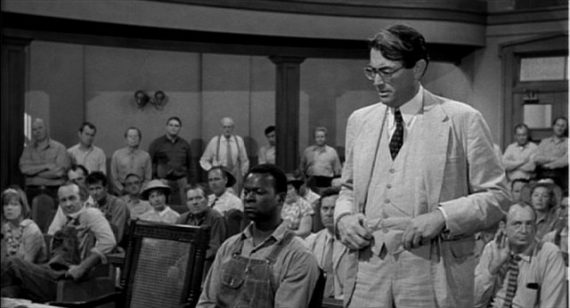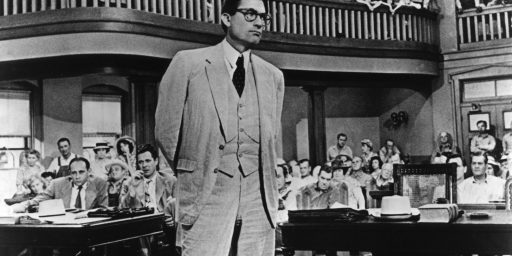Mississippi School District Bans ‘To Kill A Mockingbird’
The school district in Biloxi, Mississippi has removed 'To Kill A Mockingbird' from the 8th-grade reading list because it "makes people uncomfortable."
A school district in Mississippi has banned Harper Lee’s classic novel that stands even today as a powerful message against racial prejudice:
The Biloxi School District got complaints about the wording in “To Kill A Mockingbird” — an American classic being taught in 8th grade English Language Arts classes — and pulled it from the curriculum.
It was an administrative and department decision, a member of the school board said, and not something that the school board voted on. It happened Wednesday or Thursday.
Kenny Holloway, vice president of the Biloxi School Board said, “There were complaints about it. There is some language in the book that makes people uncomfortable, and we can teach the same lesson with other books.
“It’s still in our library. But they’re going to use another book in the 8th grade course.”
When asked Thursday morning if the book had been pulled from the course, Superintendent Arthur McMillan issued a statement five hours later that said: “There are many resources and materials that are available to teach state academic standards to our students. These resources may change periodically. We always strive to do what is best for our students and staff to continue to perform at the highest level.”
Sun Herald received a email from a concerned reader who said the decision was made “mid-lesson plan, the students will not be allowed to finish the reading of ‘To Kill A Mockingbird’ …. due to the use of the ‘N’ word.”
The reader said, “I think it is one of the most disturbing examples of censorship I have ever heard, in that the themes in the story humanize all people regardless of their social status, education level, intellect, and of course, race. It would be difficult to find a time when it was more relevant than in days like these.”
The current themes for 2nd term language arts classes in Biloxi this year are the Golden Rule and taking a stand. With “To Kill A Mockingbird” specifically, the teens were slated to learn that compassion and empathy are not dependent upon race or education, according to the school’s website.
The book is listed on the curriculum as core text for 8th grade ELA, the Common Core state standards for English Language Arts.
One 8th grade teacher on the school website described it as: “Compassionate, dramatic, and deeply moving, “To Kill A Mockingbird” takes readers to the roots of human behavior — to innocence and experience, kindness and cruelty, love and hatred, humor and pathos. Now with over 18 million copies in print and translated into 10 languages, this regional story by a young Alabama woman claims universal appeal. Harper Lee always considered her book to be a simple love story. Today it is regarded as a masterpiece of American literature.”
A Southern gothic novel, it was published in 1960, won the Pulitzer Prize in fiction the next year and was adapted into an Oscar-winning film in 1962.
The Biloxi Sun Herald, which first broke this story earlier this week, criticized the decision in an Editorial:
The word in question is an ethnic slur directed at black people that is so offensive this newspaper does not put it in print. But it is a word that is used all too often elsewhere. And unfortunately, too many eighth-graders have heard it far too often. And racism, unfortunately is far too prevalent in our society.
Just as it was in the 1930s Alabama that Harper Lee wrote about.
As Lee said through her character Atticus Finch:
“Why reasonable people go stark raving mad when anything involving a negro comes up is something I don’t pretend to understand.”
By removing “Mockingbird” Biloxi has missed a wonderful opportunity to have a frank discussion with their children why “reasonable people go stark raving mad.” Perhaps if we talked about race more there would be fewer people cavalierly tossing out hurtful racist language.
Acting as if race is no longer a factor in our society is part of the problem. Acting as if it is too difficult or offensive to talk about is part of the problem.
We have not, in fact, overcome racism.
The racists in our society must be confronted. They must not be allowed to assume our silence is acquiescence.
In the book, the Finch children, Scout and Jem, grow when they confront evil. They discover prejudice and overcome it. And that is because their father, Atticus, treats them maturely and guides them in the right direction.
The Biloxi school system should follow his example.
This isn’t the first time this issue has come up, of course. Harper Lee’s novel has been the subject of censorship campaigns in the past, as have other classic works of American literature such as The Adventures of Tom Sawyer and The Adventures of Huckleberry Finn. As with Mark Twain’s works, Lee’s classic novel, which stood as her own publicly released work until shortly before her death when Go Set A Watchman, a book that was sold as a sequel to Mockingbird which proved to be controversial both due to the circumstances surrounding its publication and the manner in which it treated the characters in Mockingbird that many people had come to know and love due to both to the book and the 1960 movie adaptation that starred Gregory Peck in the iconic role of Atticus Finch.
In all three of these cases, the controversy was allegedly based on the fact that the book featured the so-called “n-word” being used in some way. In reality, of course, all three books stand in no small part as critiques of the very racism and prejudice that word is supposed to represent, and all three teach lessons about racial equality and respect that were much needed at the time and still quite relevant today. This would seem to be especially true in a state like Mississippi where the people like Jefferson Davis is still celebrated as some kind of hero and the Confederate Battle Flag remains part of the state flag. The children of Mississippi would do well to learn the lessons that Harper Lee seeks to convey in her classic novel and, while the book will still be available in school libraries for now, the fact that it is being banned is a rather disappointing development for those looking for signs of racial progress in a part of the country where inequality between the races is still quite obviously an issue. Indeed, the main reason that school officials cite for removing the book from the 8th-grade reading list — that it ‘makes people uncomfortable’ — is itself a reason that it should be included and why children and adults need to continue to learn the lessons that Atticus Finch sought to teach his children.




![[Updated 1/31] Both Sides Are NOT the Same: "Banned" Book Edition](https://otb.cachefly.net/wp-content/uploads/2022/01/MausMockingbird-512x256.png)


I have to say that there is an element of good news here. I have had occasion in the last few years to point at such a perfectly normal scene as a black family at a neighboring picnic table in our local park and telling my grandchildren that I graduated from high school in a country that would have arrested that black family for using a ‘white’ park. That country was this one.
It was amazing news to them.
To a generation that did not grow up hearing “the N-word” in normal conversion, as I did, Twain/Clemons and ‘Mockingbird’ must seem unbelievably crude.
Maybe we were.
Seen on Twitter:
“If reading To Kill a Mockingbird makes you uncomfortable, you should probably read To Kill a Mockingbird.”
@Mikey: Or as I like to say, “If reading To Kill a Mockingbird makes you uncomfortable, it’s working.”
Is this censorship being driven by:
1. Right wings types who want to pretend Slavery, Jim Crow, and the Civil Rights era never happened
2. Left wing types who can’t bear exposure to anything disturbing
3. Both
@Mikey:
Also seen on Twitter:
@Stormy Dragon:
Does it really matter?
@Davebo: Yeah, it probably does.
Oh such delicate flowers.
It follows, that if you seek to establish a false historical narrative, you need to suppress the truth.
James Pearce should be happy, though. This is exactly the course he seems to be proposing(*) — don’t say anything that challenges or offends, because that’s counterproductive and won’t win anyone over. If you make kids read To Kill a Mockingbird, the next thing you know NFL players will be kneeling during the national anthem, and that will set back civil rights by decades.
(*) Of course, that’s just a guess, because James won’t actually tell us what course he’s proposing. He will, however, assure you that your course is wrong.
@Stormy Dragon: I can’t help but notice, you ignored the Right wings types who want to pretend Slavery, and Jim Crow era were the heights of of white race existence. Never mind Left wing types who just want the truth to be presented unadulterated.
@Stormy Dragon: There is another possibility. It may be driven by immature 13 year olds who horse around and act out and use it as an excuse to say those words in public tontrybtonget abrise our ifbtheir classmates. It may be that the people who are uncomfortable are the black students. Given that those words have passed from mere rudeness to deep offense, 13 may just be too young.
We had that book on our reading list in tenth grade English class.
We were very uncomfortable – about the teacher’s tests.
This is stupid. I don’t know if this is misguided lefties upset about the language of racial epithets being used as racial epithets or whether this is righties trying to keep Social Justice Warriors from infecting children, but this is just stupid.
I remember skimming this and pretending to read it in grade school, and not quite believing that America had been like what was described in the book, and looking back I don’t quite believe it ever changed. It’s an important book, and unless they find something better that teaches the same, this is just a stupid thing to leave off the general curriculum.
Now, if they are replacing it with the Autobiography of Malcolm X, I spoke to soon.
@Gustopher: Okay! Autobiography of Malcolm X it is.
The threat from right-wing book-banners is a constant; the threat from left-wing book-banners is rising sharply. Recently some on the left, supported by the Park Slope hive mind of virtue signalers, has attacked even Dr. Seuss as racist. The Cat in the Hat is a ‘minstrel,’ dontcha know.
I was among the many who refused to be quoted for this article: http://www.vulture.com/2017/08/the-toxic-drama-of-ya-twitter.html I didn’t know the reporter and at that time had not yet formally declared my intention to GTFO.
The atmosphere in young adult lit has become absolutely toxic and is part of what is causing me to leave kidlit and start writing for adults. That’s not a tragedy for me, or for literature, but it’s a bit of a ‘walk before they make me run’ situation, and I am far from alone. There is no question in my mind that the threat to free expression is greater to my left at this point, and those here who know me will understand that ‘to my left’ is a rather tiny slice of the electorate. I’ve pushed back, cheered on in DM’s and emails from writers too scared to do so publicly, but beyond a certain point my combativeness becomes a problem for other writers seen as close to me.
@michael reynolds:
That isn’t as ridiculous as you are suggesting. Did you ever see his political cartoons, before he became a children’s writer? In the ‘30s he did some pretty offensive caricatures of blacks and Jews. By WWII he had begun drawing cartoons critical of anti-Semitism and Jim Crow, but he continued to draw racist depictions of Japanese people. He did later apologize for all this stuff, and some of his children’s books (notably Horton Hears a Who) were intended as parables against racism.
http://nordic.businessinsider.com/before-dr-seuss-was-famous-he-drew-these-sad-racist-ads-2012-3
@michael reynolds: That article was interesting. But given that all this thought policing and hostility hasn’t had an effect on sales, it raised the question, why did you even engage? Whenever a group spirals down into a whirlpool of one-upped outrage there is nothing a rational person can do to influence. In the end, they will all just turn on each other in a codependent snarl. Imagine how long this comments section would last if everyone was an mbunge?
You know what parents and school districts could do when a book makes somebody uncomfortable? They could try actually discussing it with the kids.
Mississippi…figures.
The Bigot in Chief won there by almost 18 points.
The South continues to be backwards, ignorant, and dependent upon Blue States for support.
If I had my way, here in over-taxed CT, we would say no more. Become as self-sufficient as your Republicanist Dogma demands.
That would require climbing out of your ignorance, which would require better education, which would require reading books like this.
OT…
Comb-over Donnie is aligning himself with Art Laffer…perpetrator of one of the biggest frauds in American political history. Grifter’s gonna grift.
https://twitter.com/realDonaldTrump/status/919900022409449474?ref_src=twsrc%5Etfw&ref_url=http%3A%2F%2Ftalkingpointsmemo.com%2Flivewire%2Ftrump-democrats-only-want-increase-tax-all-theyre-good-at
Well, viewed in the context of a full presidential and Republican Party effort to remove, repeal and purge as many vestiges of the 8-year Obama Administration, this appears to be another very predictable occurrence in our latest race war.
These people are clearly emboldened by Trump and the new White Nationalism.
@Franklin:
That’ll never work. The school has your kid for 6 full hours a day (!!!) and you only get to talk to your kid a few minutes at dinner time. You have no idea how outmanned and outgunned you are.
[and yes, I’ve frequently heard this very argument being made]
@Just ‘nutha ig’nint cracker:
And THAT’s only if you ban phones from the dinner table!
@michael reynolds: I think you’d like this piece: http://www.yesmagazine.org/people-power/why-ive-started-to-fear-my-fellow-social-justice-activists-20171013
@MarkedMan:
Yea…That occurred to me too. Middle schoolers aren’t exactly the most humane, nuanced, and understanding population. Given that (and that K-12 students don’t have the same freedom to leave that college students do) I’m generally more sympathetic to that kind of argument here than I am in college curricula.
OTOH, I’d be curious if the school actually found a reading that examines racism, US history, and what it means to be a decent person that work as well as TKMB does, or if this was just about covering their a**es.
@Kylopod:
Oh, he was definitely a racist early on. But ask yourself: if you are in the business of writing for children, what in God’s name is accomplished for them, the audience, the kids we supposedly work for, by portraying – ludicrously in my opinion – the Cat in the Hat as a racist icon?
And when did we stop believing in redemption? Yertle the Turtle is a brilliant anti-fascist book. The Sneetches is a wonderful anti-racist book. There are African-American kids being told that their first book love affair, with the Cat, is a vile thing. Nothing is accomplished by that. No cause is advanced. Geisel is dead, his work lives on. And whatever he was like in personal life the man did more for literacy that then next ten big writers combined.
@MarkedMan:
I engaged because I am the ‘right size’ – big enough to command attention within the writing community, not big enough to turn into an NYT story. And I’m bulletproof on diversity. As much as the extremists hate me, I’ve put more diverse characters into more books than anyone else. And I’m well-off, not worried about my career being destroyed – especially since half my business is UK and ANZ, who don’t get as hysterical over nonsense.
I’ve already written an adult novel and instantly got a moderately big-time agent to take it on.
@Mikey:
Thanks!
Yeah, I think some people are beginning slowly. . . slowly. . . to recognize that it’s all become toxic and self-destructive. It’s politically insane, it makes us look like fools, it alienates allies. But as a rule the nuts are self-aggrandizing ninnies who don’t understand writing or politics or the ideology they think they’re supporting. Frankly, most of them are just f-ing stupid.
NYT had an article that addresses this more generally and gets into political implications.
https://www.nytimes.com/2017/10/14/opinion/sunday/millennials-freedom-fear.html
@michael reynolds:
I honestly had never heard of this accusation about Cat in the Hat until you mentioned it today. I was reacting to your overall disbelief in the idea of Seuss as a racist.
I’m a big admirer of Seuss. I even once did a college paper on The Lorax. I think his work as a political cartoonist has been overlooked (not all of it was racist), and in many ways his children’s books are a continuation of that work. Yertle is about Hitler, the Lorax is about industrial pollution, the Butter Battle about nuclear war, and so on.
I can’t help being a little cynical about people who claim to have put their racist pasts behind them, but I do realize it happens and I do believe in redemption. The question is how you distinguish between the people saying it for opportunistic reasons and the people who make genuine amends: the Jesse Helmses and Trent Lotts on the one hand, versus the Hugo Blacks and Robert Byrds on the other. In either case I’m less interested in what’s in people’s hearts than in their actions.
The problem comes when a person’s bigotry overshadows any later attempts to disavow it. Charles Dickens was stung by criticisms of anti-Semitism in Oliver Twist, and he tried to make up for it: he removed most of the references to Fagin’s Jewishness in later editions, and he wrote another book with a sympathetic Jewish character. But the damage was done.
Then there is Roald Dahl, whose first edition of Charlie and the Chocolate Factory depicted the Oompa-Loompas as African pygmies, which was changed after a public outcry. Dahl also went to his grave as a fairly unapologetic anti-Semite, though none of his best-known work contains any obvious anti-Jewish content. (I always wondered about a passage from The Twits about how disgusting bearded men are. It’s kind of like when you find out that Orson Scott Card is an unreconstructed homophobe, and then you notice that the aliens in Ender’s Game are called “buggers.”) What makes it a little easier to deal with a figure like Dr. Seuss is not only that he appears to have personally changed, but that the racist material is found in stuff of his that’s been mostly forgotten.
But we also need to face the fact that literature of the past very often does not measure up to 21st century standards of morality. Plenty of it is racist, sexist, anti-Semitic, homophobic, you name it. What do we do about this? Do we censor it? Do we bowdlerize it, like the removal of the black centaurs from most modern releases of Fantasia? Edgar Allan Poe’s “The Gold Bug” contains a depiction of a plantation slave that looks pretty offensive today, but the first time I encountered the story as a kid was a bowdlerized version in which the character is referred to as a “servant,” his patois is translated into Standard English, and the illustrations make his features ambiguous enough that he might be Caucasian. When I later got around to reading the original story, its content came as a shock to me.
Personally, I’m against this sort of thing. If you don’t want your kid exposed to such a story, I think it’s better to keep it from them outright than to alter it–the latter strikes me as a form of rewriting history. But I also think that kids should be exposed to racism and other wrongs in past literature–because it’s a part of our history. The racism should be used as a basis for discussion, with the understanding that these stories are a product of their time and place. And of course, none of that precludes also introducing your kid to literature beyond the traditional Western canon.
@JohnMcC: I remember the “Huckleberry Finn” controversy of years ago. One of my favorites was “Life on the Mississippi”.
It was also a very good tv series.
@gVOR08:
In a democracy, the person with the most votes wins. If the US were a democracy, we would have President Clinton right now. We have something else, a semi-democratic republic of states.
Perhaps what these Millennials are saying is that they just aren’t willing to start a revolution just yet.
@Gustopher:
We do not know that. If the rules were different, people would act different.
@Kylopod:
One of the reasons I’m pushing back against the far left in kidlit is an effort to get people to actually think about this issue. There is no intellectual consistency. If we start banning every book written by an S.O.B. we’re going to have a lot of available shelf space.
We need a more mature approach. Are we banning Shakespeare over Shylock? Lewis Carrol over suggestions of pedophilia? Ezra Pound for being a Nazi sympathizer? The list goes on and on. It’s obviously unsupportable. There just aren’t a lot of saints working in the creative world, and if they were saints they’d write sh!t books because saints are generally dull people. And if we start banning books because of author’s perceived offenses against the Left, how do we defend books from the Right, from religious people who are sincerely offended by lifestyles we find acceptable?
I oppose all banning of books. I’m a Jew and would not ban Mein Kampf. I’m a caputalist and would not ban Kapital. I’m a literate human being and would not ban 50 Shades of Grey.
@michael reynolds:
Damn… I was sure you were going to use a Dan Brown novel in that slot. I would have.
@DrDaveT:
It was not an easy choice. So very many possibilities.
@michael reynolds:
So, I haven’t actually attempted to read 50 Shades…
Can the prose, dialog, plotting, and general craft possibly be worse than Brown? I mean, I laughed out loud through most of the first 50 pages of The Da Vinci Code… and then I started sobbing uncontrollably. It was that bad, in a “no parody could match this, because you would recognize it as a parody by a competent writer” kind of way.